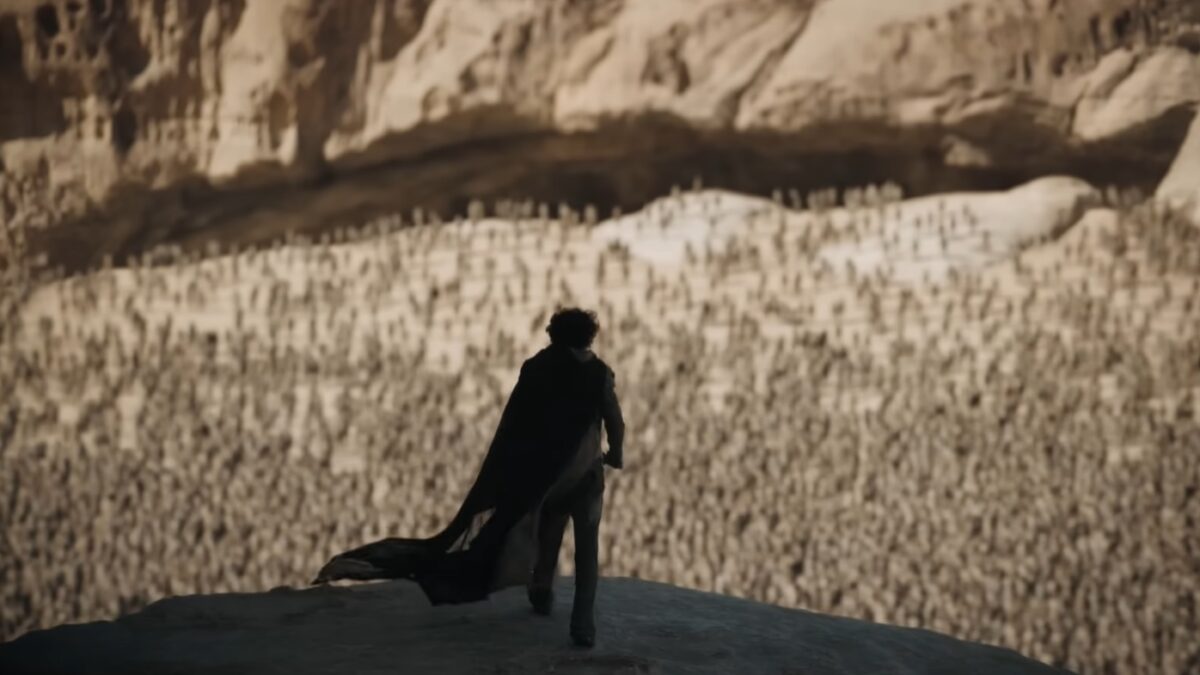A month after it was released and became the top-grossing movie of the year, it’s fair to declare “Dune: Part II” a box-office success. That said, it has to be one of the most unusual blockbusters to come out in a long time. The novels may be well-known, but they’re not exactly tailor-made for popular consumption, nor does Denis Villeneuve’s adaptation do much to make it more accessible. His movies are ponderous, slow, and extremely serious. The characters are less human beings with personalities and more Jungian archetypes fulfilling their predestined role in an indifferent cosmos.
True, the movie is visually stunning, and the action sequences are superbly choreographed, but these scenes mainly serve to punctuate several long stretches of literal and metaphorical desert. This tends to make the experience of watching both “Dune” movies a more meditative and reflective endeavor than an engaging or fun one.
So why is “Dune: Part II” so popular? I believe it’s because it presents a compelling vision of the distant future that touches on some unseen current realities. Something about it clearly resonates with audiences. Behind the endless sand, royal houses, mineral extraction, bulbous spaceships, and colossal sandworms, the saga detailing the rise of Paul Atreides and the indigenous Freman speaks to today’s audiences.
Even though the movie critic Titus Techera makes a good case that “Dune: Part II” essentially adopts a leftist narrative in which a liberal atheist man-child harnesses the power of colonized fundamentalists to overcome exploitative fascists and liberate the benighted natives, political scholar Kody Cooper comes nearer to the truth when he argues that “Dune” appeals to viewers with a few key conservative religious themes: “Another comparison that comes to mind is more remarkable: how conservative, in many of the best senses of that term, the film is.” He explains how the movie devotes attention to the dignity of life, the prominent role of faith in culture, and the danger of political messianism.
Religion Is Not Obsolete
Before considering the merits of Cooper’s assertions, it’s important to note just how exceptional it is that a work of science fiction includes any religious dimension at all. Most writers in the genre instinctively begin with the premise that all future science and technology render all religions obsolete. Accompanying this triumph of atheism is a centralized political order that takes the place of God. Whether it’s a TV series like “Star Trek” or “The Expanse,” or films such as “Blade Runner” or “Starship Troopers,” or even the classic novels 1984 and Brave New World, there’s always some world government or megacorporation running an intricate social system enabled by technology.
By contrast, the world of “Dune” is chock-full of religion, mysteries, rituals, traditions, and spirituality. And while an emperor seems to rule over humanity like some kind of god, actual governing rests with noble houses that are put in charge of various planets. In the view of Dune author Frank Herbert and Villeneuve, humanity will technologically progress to a point where people can travel through space and colonize inhospitable planets like Arakis but politically regress to a monarchical system resembling the Holy Roman Empire.
Yet when one looks closer at the religious elements of “Dune,” there is something off about all of it. Even if Techera is wrong to interpret the movie as some post-Christian liberal allegory, he’s right to sense that the film and its source material are antithetical to what today’s world understands as religion — that is, a spiritual discipline combined with a moral code. In “Dune,” there is no actual morality or theology. Rather, there is a predestined divine order and unknowable mysteries. This is why the characters all seem to lack much internal conflict (at least in the movies), and why their beliefs have little to say about the existence of good or evil.
The science and technology of “Dune” are also of a piece with this unfamiliar religion. Paradoxically, advanced technology such as space travel and energy forcefields have resulted in humanity fighting with blades and traveling in monolithic ships that function like boats that float through space on their own accord. Even the extraction of the all-important resource spice feels more like a spiritual form of work, granting godlike power to human beings, not a complex process requiring technical know-how.
Reflecting Neopaganism
All things considered, it would be more accurate to say that the “Dune” movies reflect a kind of neopaganism. Much like the mystery cults and animistic devotions of the pre-Christian West, the prophecies, rituals, visions, and the psychic magic of Paul, the Freman, and Bene Gesserit priestesses all come together to inform future humanity’s worldview. And as with these ancient belief systems, divinity is synonymous with power, key mysteries are guarded by gnostic cults, and blind faith in political messiahs and golden ages abound.
As much as the surprising success of “Dune: Part II” says about the changing landscape of popular cinema, it says even more about the changing landscape of the West’s religious faith. As John Daniel Davidson argues in his new book Pagan America: The Decline of Christianity and the Dark Age to Come, America and the rest of the West have entered an era of neopaganism in which Christianity has been effectively replaced by a wide assortment of mystery cults, superstitions, and incoherent moral philosophies. As he puts it:
America is becoming pagan. That doesn’t necessarily mean a sudden surge in people worshipping Zeus or Apollo (although modern forms of witchcraft are on the rise). Rather it means an embrace of a fundamentally pagan worldview that rejects both transcendent moral truth and objective reality, and insists instead that truth is relative and reality is what we will it to be.
While a story about royal houses fighting over a planet of sand to profit from the production of spice would strike past audiences as incredible to the point of being incomprehensible, it actually makes a good deal of sense for today’s audiences. Today’s oligarchs wield enormous power, today’s cults based in abstractions and fuzzy reasoning are alive and well, and human agency these days seems largely predetermined by vast unknowable forces. Even those Enlightenment ideals that extolled scientific reasoning have fallen by the wayside, as science seems increasingly like magic to people today. “Dune: Part II” is indeed a strange movie, but the world has become a strange place, and this is all leading to a strange new moment in today’s culture.
Of course, reverting to paganism should bother everyone, believers and nonbelievers alike. It might make for interesting and evocative science fiction films, but as the whole of human history proves, it inevitably spells disaster for human flourishing in the real world.









